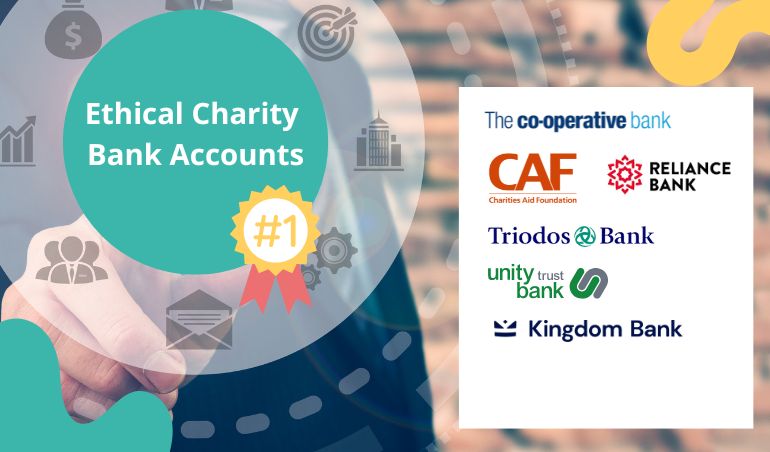Pete Marfleet is a verified ExpensePlus consultant and bookkeeper and manages the finances of a number of medium-sized charities. He’s recently been on a mission to find charity bank accounts that balance high ethical values with efficient and easily accessible banking services. In this blog post he shares what he’s found.
Many banks offering charity accounts have clunky and slow systems. It may be their online services or difficult-to-use international payment systems. Adding to the frustration are things like, the process of changing authorised signatories, mandates, and basic amendments to payees. Things that should be easy become time-consuming tasks. Perhaps you know the feeling?
But there’s another driving factor behind changing banks, and in my opinion it’s far more important than my complaints above. It’s the desire to keep charity funding in banks with high ethical values and standards.
As charities, we have a responsibility to use banks that are ethical and sustainable. Let’s ask ourselves:
Does our bank have ethical policies and practices that match our charity’s own ethical position?
If the answer is ‘no’ or ‘not really’, then it is our responsibility to do something about that. But that’s easier said than done!
The challenge of finding an ethical charity bank account
Finding a new charity bank account that balances high ethical values with efficient and easily accessible banking services has proven to be a challenging task.
At first, I considered big high street banks like Lloyds, Barclays, and HSBC. They seemed logical choices that would provide a very low level of risk and hopefully a good user experience.
However, I found that almost all of the high street banks are rated at the bottom of the ethical ratings table. For example, look at The Good Shopping Guide’s ethical comparisons table. After further research, I realised that I couldn’t in good conscience recommend them to the charities I work with.
I next looked into some of the best-rated ethical banks, like Monzo and Triodos. I was disappointed to find that neither bank offered current accounts for charities or limited companies by guarantee at the time of writing. Tridos used to offer charity accounts, but no longer provide current accounts or deposit accounts to new charity customers.
Other account providers that do offer charity accounts, like Co-op Bank, looked promising at first. But after reading through the poor user reviews on Trustpilot, I discovered various limiting factors. These put me off from a usability and customer satisfaction perspective.
Nationwide offers charity accounts, but these are only savings accounts, not current accounts.
So I put together a shortlist of banks in the search for the ‘Best ethical banks for medium-sized charities.’
Ethical banks that offer charity current accounts
 |  |  |  |
| Owned by The Salvation Army, they give up to 75% of profits to The Salvation Army International. In 2019 they rebranded to reflect the bank’s renewed commitment to socially responsible banking. | Launched in 1984, unity trust bank has focused on serving the needs of charities, local councils, social enterprises, co-operatives, voluntary organisations and credit unions. | Founded on cooperative values, this is the only bank featured with a High Street presence. It prides itself on a customer-led Ethical Policy. | Owned by the Charities Aid Foundation (CAF), all profits are reinvested to help fund CAF’s work supporting the charitable sector. |
Comparing ethical charity current accounts
Below is a comparison of four ethical banks in the UK that offer current accounts.
To be included in the comparison, I set three minimum requirements in this order of priority:
- A ‘good’* ethical score was required. This ruled out most well-known high street banks. See this ethical ratings table from The Good Shopping Guide. CAF has been included for comparison.
- The bank must be protected by the Financial Services Compensation Scheme (FSCS).
- The bank must offer a charity current account.
 |  |  |  | |
| Ethical Score | Good | Very Good | Very Good | Improving** |
| FSCS protected? | ✅ | ✅ | ✅ | ✅ |
| Charity Accounts? | ✅ | ✅ | ✅ | ✅ |
| Dual Authorisation? | ✅ | ✅ | ✅ | ✅ |
| Customer Satisfaction | Very Good | Average | Poor | Average |
| Paying Cash & Cheques | Via RBS/NatWest (charges apply) | Via RBS/NatWest (charges apply) | Via Branch or Post Office (free) | Via HSBC or RBS |
| International Payments | Yes – via online banking | Yes – via paper forms | Yes – via phone call | Yes – via paper forms |
| Cards Offered | Debit Card | ‘Payment’ Card | Debit and Credit Cards | Business Cards |
| Faster Payments? | ✅ | ✅ | ✅ | ❌ |
| Switching Guarantee? | ✅ | ✅ | ✅ | ❌ |
| Open Banking API | ✅ | ✅ | ✅ | ✅ |
| Account Fee | £5pm + others (most transactions £0.25) | £6pm | Free | £5pm |
| Minimum Turnover required? | £250,001 | £500 minimum deposit to open | N/A | None |
| Maximum Turnover accepted? | £2 Million | £1 Million | N/A | None |
| Website | reliancebankltd.com | unity.co.uk | co-operativebank.co.uk | cafonline.org |
Notes:
*Determining a ‘good’ ethical rating involves some subjectivity. I started with The Good Shopping Guide ethical ratings table and chose ‘good’ as a rating of 75-80. ‘Very good’ is a rating above 80. Where I included other banks, I conducted personal research on their ethical and sustainability policies, including using Ethical Consumer.
**CAF Bank received positive marks in the Company Ethos category. These were for having a non-profit trading structure and for providing products that were innovative social alternatives. However, Ethical Consumer marked them down in their 2022 report due to a lack of transparency on fund holdings. They said they “could not determine which companies CAF Bank held investments in.” They described them as ‘Getting there’ in Ethical Consumers’ investment transparency rating.
Best ethical current account for medium-sized charities
From my research, I chose Reliance Bank. You will need to decide for your charity the bank account that is right for you.
Although it’s not on the Good Shopping Guide’s list of ethical banks, Reliance Bank meets all of my important criteria for customer service and usability.
Reliance used to be called The Salvation Army Bank and was founded in 1890. It offers current accounts, savings accounts, mortgages, and loans. It also focuses on lending money to organisations that deliver ‘positive social impact’ and would struggle to borrow from traditional lenders. It donates up to 75% of its profits to The Salvation Army International Charity. It is owned by charitable foundations, so its focus is not profit but lasting social change.
They have a clear and transparent ethical policy, and have outperformed high street banks in customer satisfaction for over four years. Additionally, they offer FSCS protection and have a new, modern online banking website. With Open Banking, there’s even the potential for ExpensePlus to import statements directly to your bookkeeping account in the near future. All of these factors make Reliance Bank stand out from the rest.
Finally, two additional points to highlight about Reliance Bank:
- The fees. Whilst their modest £5 per month account fee is cheaper than many banks, they do charge other fees associated with all automatic payments, cash and cheque deposits, and debit card use. For example, those fees would have cost one of my charities £30 in transaction fees last month, so consider what that means for your charity.
- International Payments. Reliance business accounts provide access to normal international transfer systems. However, they may be hesitant to work with charities with a high volume of international transfers. I encountered a situation where I tried to open an account for a charity but it was rejected due to the significant number of international payments expected. Reliance explained that being a small bank, they were unable to accept the application due to the high costs when processing large volumes of international transfers.
Ethical charity savings and investment accounts
Now we’ve considered ethical current accounts, it’s worth also considering what ethical savings accounts are available for charities. At the time of writing (Autumn 2023), the Bank of England base rate is 5.25%. This gives charities a great opportunity to generate income from interest on the reserve funds that they hold.
There are several routes you might take to generate income at higher interest rates than what your current account will provide.
Investment funds
This form of investing is generally considered lower risk than trading directly in equities. It involves placing money into managed funds, where the fund manager will trade on the stock markets on your behalf, seeking a return on your investment. However, there is no guarantee that your investment will be profitable. There is always a risk that the fund may underperform and you may lose money.
Deposit funds
If you want to invest your charity funds but do not want the risk that comes with underperforming investment funds, then deposit funds allow you to invest with a lower, but guaranteed return.
Bonds
Traditionally, bonds are considered less risky investments compared to funds. Bonds are issued by companies or the government, who borrow money from investors for a fixed period. In return, investors receive an agreed percentage of interest when the bond matures.
High interest saving accounts with instant access
These bank accounts offer either a fixed or variable interest rate and allow you to withdraw money at any time without penalty. They are particularly useful for charities that may need to access funds in the short term. However, the interest rates available for these accounts will be lower as a result.
High interest saving accounts with limited access
If you want to earn higher interest rates, limited access savings accounts offer that opportunity, if you are willing to lend your money for a longer period of time. To achieve this, the bank may require a notice period of 30, 60, or 90 days for withdrawals, or impose limits on the number or size of withdrawals in a year. This is an excellent choice for charities with a stable cash flow and no immediate need for a lump sum, such as a reserve, within the next 30 to 90 days.
High interest saving accounts with no access for a fixed term
These savings accounts generally offer the best interest rates. They have a fixed term that locks your funds away until a specified date, typically 1, 2, 3, or 5 years. This is a suitable option if your charity has a long term project it is saving for and is confident that it will not need to access the funds before the agreed date. However, please note that if providers do allow withdrawals before the agreed date, a financial penalty will be charged.
Ethical savings products compared
Here’s a comparison table for 3 well-known ethical investment and savings providers covering each of the different options mentioned above (correct at the time of writing in Autumn 2023):
| Bank | CCLA (CofE) | CCLA (CofE) | Kingdom Bank | Kingdom Bank | Charity Bank | Charity Bank |
| Fund / Account | CBF Church of England Deposit Fund | COIF Charities Ethical Investment Fund | Organisation Savings Bonds | Church and Charity Higher Rate Reserve Account | Ethical 100-Day Notice Charity, Trust and Unincorporated Association Account | Ethical 40-Day Notice Charity, Trust and Unincorporated Association Account |
| Type | Deposit Fund, Variable rate | Investment Fund | Bonds, Fixed Rate | Savings Deposit, Variable rate | Savings Deposit, Variable rate | Savings Deposit, Variable rate |
| Objective | High level of capital security and competitive rates of interest | Long-term total return comprising growth in capital and distributions. | Savings bonds with a range of fixed terms – 6, 12, 24 or 36-month terms | High-interest savings options for charities wanting to save responsibly | High-interest savings (through lending money to other charities and social enterprises) | High-interest savings (through lending money to other charities and social enterprises) |
| Interest Rate % (AER) | latest rate 5.15% | N.A | 2.8% – 3.7% | 3.75% | 2.69% – 2.84% | 2.54% – 2.70% |
| Min Investment | Nil | £1,000 | £2,000 | £1 | £1,000 | £1,000 |
| FSCS cover | NOT protected | May be protected | FSCS – Protected | FSCS – Protected | FSCS – Protected | FSCS – Protected |
| Comments | None | None | Variable fixed | 90 Day notice period (fees for early withdrawal) | 100 Days notice period | 100 Days notice period |
| Website | Click Here | Click Here | Click Here | Click Here | Click Here | Click Here |
Choosing an ethical savings product for your charity
The product that is right for your charity will depend on your charity’s requirements. Here are some things to consider to help you choose.
If you want to go down the investment funds route, be aware of the higher risks. My recommendation is to get professional investment advice before doing so. Also remember that your charity will need to have an investment policy, as required by the charity commission. Finally, please note that the two fund options in the table above don’t have the FSCS assurance that you might require.
If you’re looking at the bonds option, be aware that the best interest rate offered is currently the shortest 6-month option, and the longer fixed-term interest rates reduce significantly. This is due to the expectation that the currently higher base rate will drop over those longer time periods.
If you go for the savings account options, note that the rates are variable, and could change at any point. Charity Bank has a range of savings account products, other than the ones listed here, so it’s worth having a look at what’s on offer if the 40 or 100 day options are not right for your charity.
Please note that this analysis is not intended to be taken as financial advice. Instead, I recommend that charities and churches evaluate for themselves which bank best aligns with their organisational needs and values, recognising that there may be trade-offs between factors such as fees, usability and ethical credentials.

Pete Marfleet is a verified ExpensePlus consultant and bookkeeper. He offers a range of cost-effective services, from outsourced bookkeeping and ExpensePlus training, to project managing the migration of your current accounting systems to ExpensePlus. Don’t hesitate to reach out to Pete at www.pdmarfleet.co.uk for more information.







